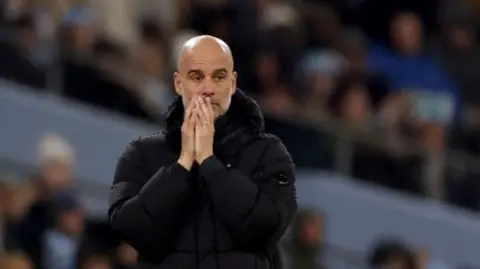
Maybe I Should Have Made Summer Signings – Guardiola Reflects on Squad Decisions
Pep Guardiola, one of football’s most renowned tacticians, is known for his meticulous planning and foresight. However, even a manager of his caliber is not immune to hindsight reflections, as evidenced by his recent comments regarding Manchester City’s squad. Guardiola openly admitted that he might have underestimated the impact of failing to make summer signings, raising questions about squad depth and the challenges of competing on multiple fronts.
A Season of Intense Competition
Manchester City entered the season as defending treble winners, carrying the immense expectations that come with such historic success. While they began the campaign strongly, cracks have started to appear as the season progresses. Injuries, fatigue, and a congested fixture schedule have tested the resilience of Guardiola’s squad, prompting the manager to consider whether he should have bolstered his ranks during the summer transfer window.
“We’re always trying to plan ahead,” Guardiola said in a post-match interview. “But maybe, looking back, we could have done something differently. Maybe I should have made summer signings to give us more options, especially considering the demands of this season.”
These words from Guardiola hint at the pressures of maintaining success at the highest level, where every decision—or lack thereof—can significantly impact a team’s trajectory.
Limited Summer Activity
City’s transfer activity during the summer window was relatively subdued by their standards. While the club made key acquisitions, such as signing Josko Gvardiol to strengthen the defense, they did not engage in the kind of comprehensive squad overhaul some might have expected after a grueling treble-winning season.
At the same time, notable departures, including Riyad Mahrez and Ilkay Gündogan, created voids in the squad. Gündogan, in particular, was a vital part of City’s midfield, providing leadership and crucial goals in pivotal moments. While the arrival of Mateo Kovačić and the promotion of young talents added depth, questions remained about whether these moves were sufficient to maintain City’s dominance.
Guardiola’s admission suggests that the club might have underestimated the toll of losing experienced players, as well as the physical and mental demands placed on the remaining squad members.
The Impact of Injuries
Injuries have further complicated matters for Guardiola this season. Kevin De Bruyne, one of City’s most influential players, has been sidelined for an extended period due to a hamstring injury. His absence has left a creative void in midfield, forcing Guardiola to experiment with different combinations and tactics to compensate.
Additionally, the squad’s heavy workload has led to concerns about player fatigue. Competing in the Premier League, Champions League, and domestic cup competitions requires exceptional depth, and Guardiola’s relatively small squad has been stretched thin at times.
“Football is unpredictable,” Guardiola remarked. “You can never fully prepare for injuries or how the season will unfold. But perhaps we could have given ourselves more room to navigate these challenges.”
Tactical Adaptations
One of Guardiola’s strengths as a manager is his ability to adapt tactically. This season, he has experimented with various formations and player roles to maximize the potential of his available squad. For example, Phil Foden and Bernardo Silva have been tasked with taking on greater creative responsibilities in De Bruyne’s absence, while Rodri has continued to anchor the midfield with consistency.
However, even Guardiola’s tactical genius has its limits. The lack of fresh legs and competition for places can hinder a team’s ability to maintain intensity throughout the season. This is particularly true in high-stakes matches where small margins often decide the outcome.
Learning from the Past
Guardiola’s comments reflect not only his willingness to acknowledge potential missteps but also his commitment to learning from them. “You can’t change the past, but you can always learn from it,” he said. “Our focus now is on finding solutions and making the best of the players we have.”
The January transfer window presents an opportunity for City to address any deficiencies in the squad. While Guardiola has historically been cautious about making mid-season signings, the current circumstances might prompt a different approach. Adding reinforcements could alleviate some of the pressure on the current squad and provide fresh impetus for the challenges ahead.
The Bigger Picture
Despite these challenges, it’s important to recognize that Manchester City remains a formidable force. The team is still competing at the highest level across multiple competitions, and their ability to overcome adversity has been a hallmark of Guardiola’s tenure.
However, Guardiola’s reflections serve as a reminder of the fine margins in football. Even the best teams can struggle without adequate planning and depth, especially in an era where the physical demands on players are greater than ever.
Looking Ahead
As City navigates the remainder of the season, Guardiola’s ability to manage his squad and adapt to evolving circumstances will be critical. The team’s success will depend not only on the performances of star players like Erling Haaland and Jack Grealish but also on the contributions of less-heralded squad members.
Meanwhile, Guardiola’s candid acknowledgment of the need for potential reinforcements highlights his commitment to continuous improvement. Whether through January signings or tactical adjustments, City will be looking to reinforce their position as one of the world’s top football teams.
In the ever-competitive landscape of football, Guardiola’s introspection is a testament to his pursuit of excellence. As he said, “We’re always looking to improve, and that’s what keeps us moving forward.”
Leave a Reply